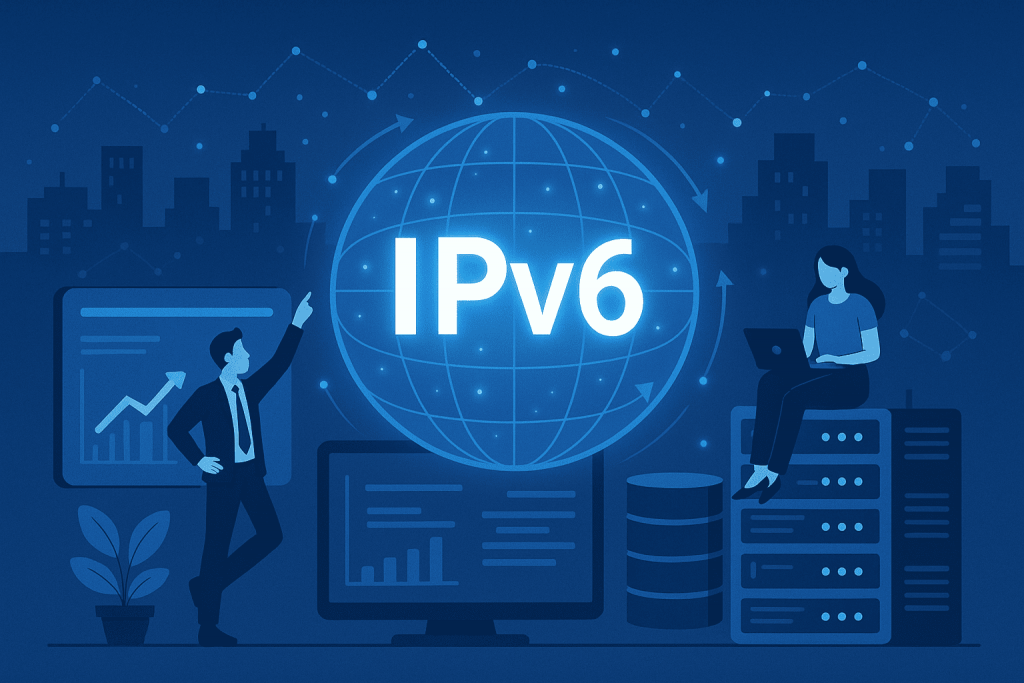
A few years ago, it became clear that IPv4 address space was no longer sufficient for the growing needs of businesses. For companies that operate their own servers or rent resources in data centers, this meant limitations in scaling infrastructure and connecting new clients. IPv6 became the logical next step: it provides an almost unlimited address space, simplifies server network management, and ensures modern security mechanisms. Thanks to this, company servers can seamlessly grow along with the business, maintaining stability and opening new opportunities for development.
Infrastructure Expansion and Scalability
IPv6 offers a massive address pool – about 3.4×10^38 unique addresses. This means that companies can connect new devices, services, and branches to the network without the risk of running out of addresses. In addition, the need for complex network translation (NAT) disappears: each device receives its own public IP address. This approach simplifies network design and management – adding new servers or branches becomes much easier.
Enhanced Security
IPv6 includes built-in security mechanisms. In particular, the protocol has IPsec for encrypting and authenticating traffic. This means that corporate data – from client transactions to internal communications – can be securely protected at a higher level. For businesses, this is critical: for example, financial and banking services have strict security requirements, and every breach can result in significant losses. IPv6 allows such systems to be strengthened and secured more efficiently.
Support for the Internet of Things (IoT)
IPv6 plays a crucial role in the development of the Internet of Things: its vast address space allows millions of sensors and smart devices to be connected. There is no longer a need to “save” addresses – every sensor or gadget gets its own unique IP. This opens the door to new services and products. The Internet of Things heavily relies on IPv6, and the transition to the new protocol is necessary for the growth of smart cities, intelligent manufacturing, and other innovative areas.
Industries That Benefit
- E-commerce: Online stores and marketplaces can serve more clients simultaneously, as each user or server can be assigned a unique address.
- Telecommunications: Mobile operators and providers are actively preparing for 5G and the massive connection of devices. New networks support millions of connections in small areas, which old protocols cannot handle. IPv6 has a huge address pool, native mobile network support, and built-in protection, making it the natural choice for modern mobile and fixed networks.
- Fintech and Banking: These sectors work with sensitive data and conduct numerous online transactions. IPv6 with IPsec helps protect information and ensures communication reliability. In addition, the absence of NAT simplifies integration with foreign partners and new services, which is vital for global financial operations.
- Cloud Services: Cloud providers use IPv6 to ensure scalability and high throughput for thousands of clients. With IPv6, they can easily expand infrastructure without complicated network restructuring.
- Manufacturing and IoT: The number of smart devices and sensors in enterprises is growing. Industry 4.0 is unthinkable without IPv6: these devices require unique addresses to communicate. IPv6 allows vast device networks to be integrated, accelerating automation and improving production efficiency.
Key Benefits of IPv6
IPv6 is not just a technical upgrade but a key to the future of the digital economy. It solves the problem of IP address shortage, enhances network security, and makes systems more scalable. For Ukraine and the world, the transition to IPv6 means building a stable foundation for innovation, the growth of e-commerce, telecommunications, fintech, cloud services, and manufacturing. Businesses that aim to remain competitive must already be prepared to adopt IPv6 today.

Leave a Reply